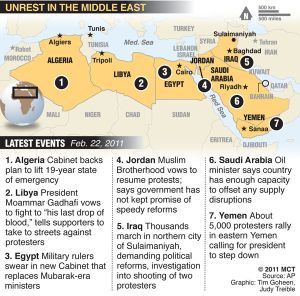Since the end of January, the attention of millions of people has been on the Middle East and it’s pro-democracy demonstrations.
For Dr. Jo Saba, psychology professor at Eastern University, the civil unrest hits close to home. Saba came to the U.S. from Egypt when he was 18 to further his education. His family and friends are living in the civil unrest that has been rocking the country since Jan. 25.
“The government did not invest sufficiently in fighting poverty for Egyptians. [This] is a concern of mine. Even though I’m not a poor man working in Egypt, but it concerns me out of social justice perspective,” Saba said.
After completing his Masters in counseling psychology, Saba lived and worked in Egypt from 2002-2005 as a psychotherapist. He owned his own practice in addition to working in a hospital right outside of Cairo.
Saba could relate with the protesters, although most of their complaints did not affect him directly.
“I see the lack of initiative and misdirected finances as oppressive,” Saba said, referring to the Egyptian government concerning itself more with military improvements than economic development.
President Hosni Mubarak, after increased pressure internally and from the international community, stepped down and handed over power to the military on Feb. 11. Egypt followed Tunisia as the second Middle Eastern country to have it’s citizens take to the streets in pro-democratic demonstrations that led to the removal of their leaders.
Saba said his family that is living in Heliopolis, a suburb of Cairo, are following closely to what is going on.
However, they have not been affected by the violence.
“My family has been blessed to not be harmed or touched in any direct way,” Saba said.
In response to protesters organizing their demonstration efforts via social media, Mubarak attempted to shut down the internet and cell phone use across the country.
Despite this, Saba was able to communicate with his family over the phone regularly even though at times it was spotty.
For over 30 years the Egyptian government, led by Mubarak, enjoyed friendly relations with the U.S.
The U.S. Agency for International Development (USAID) has given Egypt $28 billion since 1975, which was marked for economic and development assistance.
The U.S. has given $1.3 billion annually in aid towards modernizing the countries military, according to the U.S. Department of State.
Since Jan. 25, other countries have faced similar demands from its people. Bahrain, Iran, Jordan, Lebanon, Libya, Syria and Yemen are also seeing civil unrest directed at the government.
Saba, who is watching from afar, sees his country moving in the right direction and credits the students for their sacrifice for their country.
“I feel proud of the Egyptian students who started the demonstrations for advocating for themselves and for the oppressed in Egypt,” Saba said. “I’m proud of them for the changes that are already made. The sacrifices they have already made have not been a waste.”


